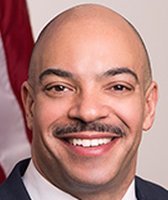Stand up for the facts!
Our only agenda is to publish the truth so you can be an informed participant in democracy.
We need your help.
I would like to contribute
Democrat party bosses want Pennsylvanians to hear the name "Pat Toomey" and immediately think of Wall Street.
It’s part of why the Democratic Senatorial Campaign Committee is running ads across the state claiming Toomey, an incumbent Republican, ran a bank that used predatory lending practices that pushed small business owners out of their homes and then voted for fewer banking regulations in the Senate.
That ad, which was already revised once, still includes false claims.
Since the TV spot started running about a week ago, lawyers have gotten involved, cease and desist letters have been issued, the ad has been revised, the campaigns have sparred over it and the issue became a sticking point during a debate last week between Toomey and Katie McGinty, his Democratic challenger.
During that debate, Toomey claimed that McGinty and her allies are spreading lies and that, while McGinty was heading up the Pennsylvania Department of Environmental Protection, the agency used the same practice that the Democrats have chided Toomey for using. And McGinty didn’t deny it.
It’s safe to say this issue’s gotten complicated. So we decided to check not only several points in the DSCC’s ad and its revised version, but to also parse through the peripheral issues that have now become a major part of one of the most consequential senate races in the country. You'll find four rulings below.
The ad in question
The DSCC's ad went public Oct. 20, the same day lawyers representing the fundraising arm of the Toomey campaign, Friends of Pat Toomey, issued a cease and desist letter to TV station managers across the state, asking them to refrain from running the ad as it contained "blatantly false and defamatory representations about Senator Toomey."
Lauren Passalacqua, a spokeswoman for the DSCC, said a station manager on Monday asked the group to revise its ad. Passalacqua says the new ad still "carries the same message," both of which call a lending practice used by a bank affiliated with Toomey "predatory."
In the original commercial, a narrator says: "At the bank owned by Pat Toomey, it was business as usual -- forcing 21 small business owners out of their homes." In the revised ad, the narrator says: "At the bank founded by Pat Toomey, it was business as usual -- forcing small business owners out of their homes." (Emphasis ours.)
The only changes made to the ad was the language about Toomey owning the bank vs. founding the bank and the removal of the "21" figure. Friends of Pat Toomey issued a second cease and desist order saying the ad is still false, but it remains on the air in Pennsylvania.
Passalacqua said the change was made to appease a single station manager, but the ad was shipped to stations across the state and some have chosen to run the new ad with the revised language. Since the dust-up, the Toomey campaign has pounced, saying it's allies of McGinty who are spreading information so false that their ads had to be pulled and replaced.
"It takes an incredible level of dishonesty to have an ad actually pulled from the TV airwaves," Toomey campaign spokesman Ted Kwong said.
Is the lending practice really ‘predatory?’
The tactic the ad referred to that was used by Team Capital Bank is called a "confession of judgement." This clause, which is commonly inserted into commercial lending and real estate contracts in Pennsylvania, can allow lenders like banks to file suit against a borrower and then expedite the judgement process.
Kenneth Milner, special counsel at the Blue Bell-based Kraut Harris, has been a business, real estate and franchise lawyer for 40 years. He explained that confessions of judgement are used "all the time" and are required to be in readily visible language. They allow creditors to file suit when they’re not paid by a debtor and immediately win a judgement against that debtor without a hearing.
In the case of a bank working with small businesses, a confession of judgement clause would likely be inserted into a loan contract and then, if the business owner doesn’t make payments on that loan, the bank can use the confession of judgement to expedite the process. In severe cases, the bank can move toward foreclosure on real estate or on assets put up as collateral.
"In and of itself, having a confession of judgement is not predatory," Milner said, "but the remedy lends itself to predatory practice, and anybody can abuse that remedy."
Confessions of judgement can’t be used in residential real estate in Pennsylvania and they’re totally illegal in 35 states. The DSCC isn’t claiming that the bank foreclosed on homes because of borrowers defaulting on their mortgage -- they’re saying the bank foreclosed on the homes of small business owners who couldn’t pay and put up other properties as collateral.
Deborah Goldstein, the executive vice president of the North Carolina-based Center for Responsible Lending, said confession of judgement clauses have been outlawed in many states because "it really undermines the typical judicial process."
"It’s a basic principle of due process," she said. "If you owe somebody money, you should have an opportunity to dispute what they’re doing."
Raymond P. Wendolowski, an attorney in the Creditors’ Rights group at the Pittsburgh-based Bernstein-Burkley, said borrowers waive their right to due process when they sign a loan contract with a confession of judgement clause. He said he disagreed with the ad's characterization, saying confession of judgement clauses are used to ensure creditors are paid in a timely manner and are meant to keep risk low for banks.
"A bank can't operate with significant risk because if they do, they're no longer really a bank," he said. "They're supposed to be steady and stable."
Wendolowski said his firm has represented a number of banks, and having language that allows them to confess judgement against a borrower is "pretty standard." He also added that banks don't typically resort to confessing judgement and then foreclosing without significant steps taken beforehand to collect.
Ruling: The DSCC categorizes using a confession of judgement against a borrower as "predatory." Some banks may use the clauses to act in a predatory manner. But the practice isn’t just allowed in Pennsylvania, it’s very common in commercial lending. We rate this claim Mostly False.
Did the bank push people out of their homes?
The DSCC’s initial ad claimed that the use of a confession of judgement by Team Capital Bank "forc[ed] 21 small business owners out of their homes." A PolitiFact review of those 21 cases found that to be categorically false.
Passalacqua, of the DSCC, said that original figure came from a since-corrected Politico piece about Team Capital Bank’s practices. The revised version of the ad still states that "at the bank founded by Pat Toomey, it was business as usual forcing small business owners out of their homes."
But PolitiFact wasn’t able to find a single small business owner forced out of his or her primary residence. Toomey’s lawyers wrote in the cease and desist letter that they identified 12, not 21, instances when the bank used a confession of judgement.
Of those, only three properties were foreclosed on. Of those, one was vacant and another was described in court documents as a warehouse. The other residence was a home in Ivyland, Pa., but none of the five people owing cash in the case listed that home as their primary residence.
Passalacqua said the 21 foreclosures listed were simply a "cursory review" and don’t represent the potential that other homes could have been foreclosed on through a confession of judgement by the bank.
Milner said it’s possible the bank could have used a confession of judgement to foreclose on homes where a borrower lived, but it’s "very rare."
Ruling: The DSCC said even in its revised ad that the practice was used by Team Capital Bank to force "small business owners out of their homes." We couldn’t find a single instance when this occurred. We rate this claim Pants on Fire.
Toomey’s history with the bank
Back in 2005, Toomey cofounded the Bethlehem-based Team Capital Bank and sat on the company’s board until 2009, before he won his seat in the U.S. Senate in 2010. At that point, he gave up his board position and bought stock in the bank.
The senator’s financial disclosures show that he owned between $500,001 and $1 million in Team Capital Bank stock and it was notably one of his most valuable assets disclosed. But in 2013, Team Capital Bank was acquired by Provident Bank for $122 million.
That was one of the Toomey campaign’s major issues with the DSCC’s first version of the ad. In it, the group claimed Team Capital Bank was "owned by Pat Toomey," however the senator’s attorneys pointed out in a cease and desist letter that when most of the foreclosures in question occurred, Toomey was a stockholder owning less than 1 percent of the company’s stock.
The DSCC’s revised ad noted that Toomey "founded" the bank and the language about his so-called ownership was removed.
Ruling: The DSCC claimed Toomey "owned" the bank in its original ad. That is false. The organization’s revised ad claims Toomey "founded" the bank. Technically, he cofounded it. We rate this (revised) claim Mostly True.
McGinty’s DEP used similar tactic
During a debate last week, Toomey slammed the DSCC’s ad and said McGinty was making statements of "really shocking hypocrisy."
"When Katie McGinty was the secretary of the DEP, she, through the DEP, used the exact same device on their own credit extension," Toomey said. "So she has the nerve to attack me for what a bank did, a bank I was an investor in, when she was using the exact same device herself."
After the debate, Toomey’s campaign blasted out a video of McGinty fielding questions from reporters and refusing to answer the question of whether or not the DEP had used the same tactic she was criticizing Toomey over.
There was, in fact, a surety bond application from the Pennsylvania DEP dated February 2008 while McGinty was still heading up the agency. The DEP to this day uses confessions of judgement. It’s worth noting that the application for the bond is blank and doesn’t demonstrate that the DEP ever actually used a confession of judgement against another party like a bank or other lending institution would.
McGinty’s camp didn’t deny that the DEP used the same tactic, but says it’s a false equivalence and that McGinty never profited from the confession of judgement practice.
"The idea that Pat Toomey would compare his own bank's history of foreclosing on Pennsylvanians to Katie's tenure protecting the environment is a joke," campaign spokesman Sean Coit said in a prepared statement.
Ruling: Pat Toomey claimed McGinty used "the exact same device" in reference to the confession of judgement. The confession of judgement was in an application for a surety bond that was used at the DEP while McGinty was in charge. It’s worth noting it was never made clear as to whether or not the DEP used the confession of judgement against a borrower. We rate this claim Mostly True.
Our Sources
Contract. "Surety bond for a waste management facility." Commonwealth of Pennsylvania Department of Environmental Protection. February 2008.
Emailed statement. Sean Coit, spokesman Katie McGinty for Senate. Oct. 26, 2016.
Emailed statement. Ted Kwong, spokesman Toomey for Senate. Oct. 26, 2016.
Letter. Cease and Desist Demand. Steptoe and Johnson representing Friends of Pat Toomey. Oct. 20, 2016.
Letter. Follow-up -- Cease and Desist demand. Steptoe and Johnson representing Friends of Pat Toomey. Oct. 25, 2016.
Letter. Re: DSCC Advertisement. Perkins Coie representing the DSCC. Oct. 25, 2016.
News article. "Politico Pro: Bank Toomey founded to become Pennsylvania flashpoint." Politico. Oct. 7, 2016.
Phone interview. Lauren Passalacqua. Spokeswoman, DSCC. Oct. 26, 2016.
Phone interview. Raymond P. Wendolowski, attorney, Bernstein-Burkley. Oct. 27, 2016.
Phone interview. Kenneth Millner, special counsel Kraut Harris. Oct. 27, 2016.
Phone interview. Deborah Goldstein, executive vice president, Center for Responsible Lending. Oct. 27, 2016.
Press release. "McGinty has post-debate meltdown over hypocrisy and desperate false attacks." Toomey for Senate. Oct. 25, 2016.
- Video. "Nightmare." DSCC. YouTube. Oct. 20, 2016.

















































